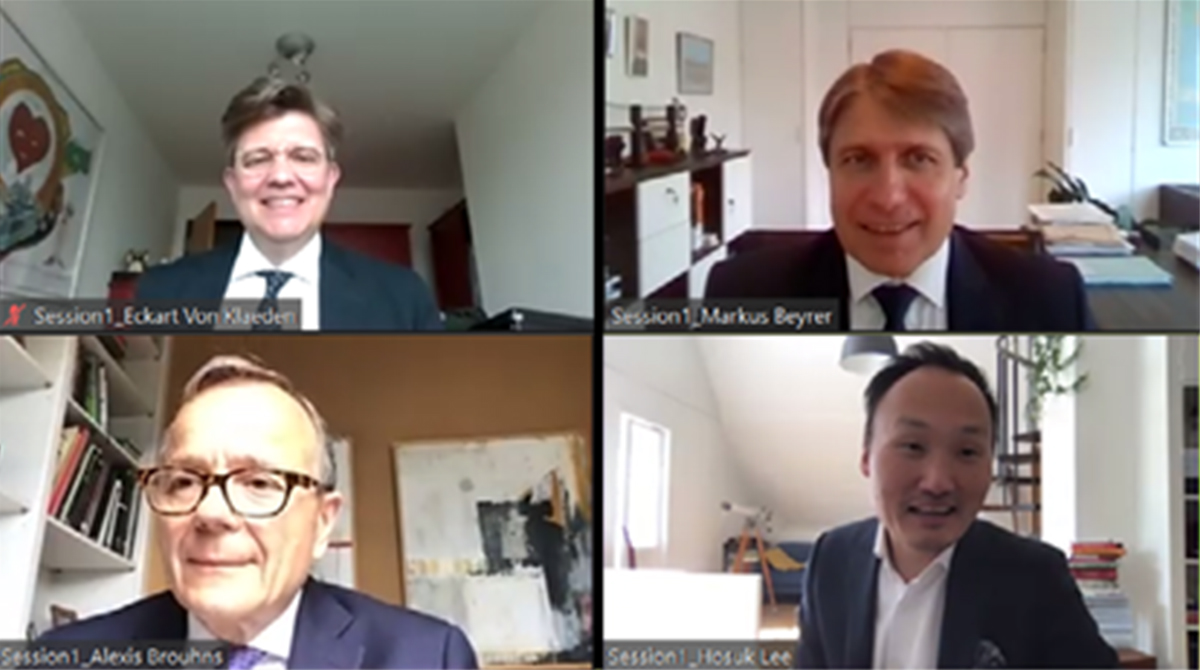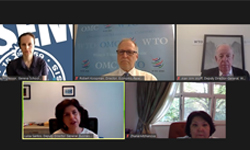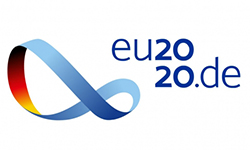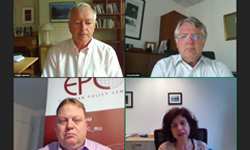BusinessEurope Headlines No. 2020-25
The importance of EU-Korea trade and joint cooperation on sustainability

“EU-Korea cooperation and open trade will play an important role in recovery efforts after the pandemic crisis”, said BusinessEurope's Director General, Markus J. Beyrer, at the EU-Korea Virtual Business Conference 2020, on 2 July. The EU and Korea, he pointed out, should take the lead in preserving multilateral and rules-based trade and show the way, including on sustainability. This means keeping up international commitments, like the Paris agreement, and embarking in a transformation towards climate neutrality. “This also means further progress on labour reforms and ratification of International Labour Organisation (ILO) Conventions as provided for in our bilateral free trade agreement. This is important if we want to maintain support for trade and trade deals”, Beyrer highlighted.
Contact: Eleonora Catella
Our comment
Smart Technological Sovereignty – a concept on the rise
By Antonia Bierbaumer, Adviser for Industrial Policy
 Without a doubt the EU must become more strategic in addressing the technological and economic challenges that lie ahead for Europe. The European Commission’s self-designation as geopolitical Commission positioned the concept high on the political agenda. Evidently, the outbreak of COVID-19 accelerated the discussion of the topic. The intensified interest stems from the increased race to secure access to critical equipment and raw materials around the world that are key components of many products used for instance in high-tech applications and low-carbon technologies. This increased reliance on third country supplies triggered concerns on supply chain disruption and the integrity of critical infrastructures and technologies.
Without a doubt the EU must become more strategic in addressing the technological and economic challenges that lie ahead for Europe. The European Commission’s self-designation as geopolitical Commission positioned the concept high on the political agenda. Evidently, the outbreak of COVID-19 accelerated the discussion of the topic. The intensified interest stems from the increased race to secure access to critical equipment and raw materials around the world that are key components of many products used for instance in high-tech applications and low-carbon technologies. This increased reliance on third country supplies triggered concerns on supply chain disruption and the integrity of critical infrastructures and technologies.
On the global level, recent developments suggest that some of Europe’s main trading partners are striving for technological sovereignty to ensure their technological supremacy. China is pursuing its “Made in China 2025” strategy and ringfences its manufacturing base, while the Unites States are intensifying their export control regime on dual use items in the scope of the “America first” strategy and are actively debating the advantages of decoupling the US economy from the Chinese. Increasingly, the EU is coming under pressure to take sides in this conflict.
The concept of technological sovereignty is expected to have a significant impact on EU and national policymaking in the years to come, as it is already part of the European Industrial Strategy and connects with recent debates on “open strategic autonomy” and “European economic resilience”. A shared understanding of what technological sovereignty means is therefore an important prerequisite. Importantly, the concept must not be understood as an end in itself, but as one of many instruments to strengthen European competitiveness and geopolitical position. Europe must develop a proactive approach towards the concept and address the challenges ahead in an “European way”. Any restrictive or protectionist interpretation of the concept, such as the establishment of trade barriers or forced establishment of uncompetitive national providers, must be avoided at all costs.
The European business community coined the addition of “smart” to the concept of “technological sovereignty” to illustrate its own understanding of the concept and demonstrate key economic principles for a successful implementation. Smart technological sovereignty is about creating the right investment and policy frameworks to facilitate the development of Europe’s industrial and technological capacities, as a strong innovative technological base is the precondition for business to compete globally. At the same time Europe must maintain an ambitious trade agenda that seeks new trade opportunities in fast growing markets if it wants to remain a global leader and become more resilient to external shocks.
COVID-19 highlighted the interconnectedness of the global economy. Several voices are now requesting the reshoring of value chains and are pushing for Europe’s self-sufficiency. These claims must be treated very cautiously, as they are not taking the nature of global business into account. Especially European companies profit greatly from free trade and their incorporation in global value chains. The systematic fabrication of all components of a product in Europe is simply unrealistic. In the long run, this would jeopardize European prosperity and technological advancement. International suppliers must have access to the Single Market if they adhere to our high standards and rules. In the case that companies decide to relocate their production, the necessary framework conditions must be in place to give them the option to do so. Additionally, Europe needs to address its reliance on critical raw materials, as a shortage in supply would have terrible effects on the economy. We need to find new ways to minimise these dependencies and diversify our suppliers base.
This position paper on smart technological sovereignty is our contribution to the ongoing discussion and shares insights on how businesses operate. Only if the concept is well-designed and used as described above, European companies will be able to thrive globally.
![]() Contact: Antonia Bierbaumer
Contact: Antonia Bierbaumer
Role of business is key in the WTO accession process
 On 29 June, Luisa Santos, BusinessEurope's Deputy Director General, participated in the high-level opening session of the World Trade Organisation's (WTO) "Accession Week". Organised annually, this is an event demonstrating the values of WTO membership and provides a forum of discussion among members and candidates. Offering the view of the private sector, Santos stressed the benefits stemming from the accession to the WTO, such as legal certainty, increased market liberalisation, transparency and non-discrimination, which are prerequisites to attract investments and bring confidence in the economy overall. "It is also important to involve the private sector in the accession process, which is not a given in some countries", argued Santos, praising the efforts of the current WTO leadership to pursue a significant opening to businesses and other stakeholders. "Companies use the multilateral trade rules framework in their day-to-day operations, including the rulings of the WTO's dispute settlement processes. It is therefore critical to ensure that the system is restored and allows for the delivery of timely decisions", concluded Santos.
On 29 June, Luisa Santos, BusinessEurope's Deputy Director General, participated in the high-level opening session of the World Trade Organisation's (WTO) "Accession Week". Organised annually, this is an event demonstrating the values of WTO membership and provides a forum of discussion among members and candidates. Offering the view of the private sector, Santos stressed the benefits stemming from the accession to the WTO, such as legal certainty, increased market liberalisation, transparency and non-discrimination, which are prerequisites to attract investments and bring confidence in the economy overall. "It is also important to involve the private sector in the accession process, which is not a given in some countries", argued Santos, praising the efforts of the current WTO leadership to pursue a significant opening to businesses and other stakeholders. "Companies use the multilateral trade rules framework in their day-to-day operations, including the rulings of the WTO's dispute settlement processes. It is therefore critical to ensure that the system is restored and allows for the delivery of timely decisions", concluded Santos.
Contact: Sofia Bournou
Discussing priorities of the German EU Council Presidency

BusinessEurope’s Internal Market Policy Committee (IMCO) welcomed the German EU Council Presidency on the very first day of its six-month term. An exchange with Dr Norbert Schultes, Head of Economics Department at the Permanent Representation of Germany to EU, focused on the German EU Council Presidency priorities under the Competitiveness Council remit, the European Recovery Plan, including its non-financial measures relevant for the Single Market and digital agenda. IMCO members stressed the need for strong Single Market reform measures and better regulation to fuel Europe’s recovery and strategic success. In its present form, the Recovery Plan suggested by the European Commission is strong on digital Single Market but misses reform actions to remove bottlenecks in the goods markets and further open the services markets. The Commission has not taken any additional steps to those that were foreseen in the Long-term Implementation and Enforcement Action Plan adopted back on 10 March 2020. IMCO members suggested the Council Presidency a number of measures to improve the Single Market, as non-financial parts of recovery measures. They are outlined in BusinessEurope’s position on the Single Market governance of 10 June. Committee members asked a number of questions to the guest, among others about how the Presidency intends to apply the “1in-1out” and other principles of better regulation at EU level, how it sees the links between the Single Market measures and the Commission’s work on 14 industrial eco-systems, what are the priorities in digital and if it is going to address long-standing bottlenecks in the processes for harmonised standardisation for products and barriers for cross-border provision of services.
![]() Contact: Martynas Barysas
Contact: Martynas Barysas
Boosting Europe in the global data economy
 BusinessEurope has responded positively to the European Commission Data Strategy as it represents a sound basis for Europe to enable itself to lead in the exponentially growing global data economy. Solving interoperability through standardisation, legal uncertainties through guidance and promoting fair, simple and intelligible data sharing agreements should incentivise voluntary data sharing through the development of common European data spaces. The implementation of the strategy should also safeguard fair competition so that equal conditions for all businesses are upheld. But data itself is not the sole enabler of innovation alone. The skills needed to extract value from data and the awareness around digital technologies in general will continue to play a critical role in Europe’s bid to lead in digital transformation - read BusinessEurope position paper.
BusinessEurope has responded positively to the European Commission Data Strategy as it represents a sound basis for Europe to enable itself to lead in the exponentially growing global data economy. Solving interoperability through standardisation, legal uncertainties through guidance and promoting fair, simple and intelligible data sharing agreements should incentivise voluntary data sharing through the development of common European data spaces. The implementation of the strategy should also safeguard fair competition so that equal conditions for all businesses are upheld. But data itself is not the sole enabler of innovation alone. The skills needed to extract value from data and the awareness around digital technologies in general will continue to play a critical role in Europe’s bid to lead in digital transformation - read BusinessEurope position paper.
![]() Contact: Patrick Grant
Contact: Patrick Grant
Assessing the impact of COVID-19 on supply chains
 Luisa Santos, BusinessEurope's Deputy Director General, on 1 July participated in a webinar on "the future of supply chains after COVID-19", jointly organised by the EU-Asia Centre and the European Policy Centre (EPC). As we are currently getting out of the crisis caused by the pandemic, there are two major issues that disturb supply chains - challenges with the transportation and delivery of goods, as not all countries are open yet and liquidity challenges, which will have to be carefully addressed in the context of the next EU budget and the Recovery Plan. Beyond the pandemic, it is also expected that the digital and green transformations will have an impact on supply chains. "In this regard, it is very important to make sure that companies stay in Europe and are not driven away by increasing costs, for instance through taxation", argued Santos. She added that "at the same time, Europe has to stay a relevant global player. As other regions, such as South-East Asia, Latin America or Africa, will grow faster, we cannot afford to become protectionist and inward-looking. We have to remain ambitious in our trade agenda".
Luisa Santos, BusinessEurope's Deputy Director General, on 1 July participated in a webinar on "the future of supply chains after COVID-19", jointly organised by the EU-Asia Centre and the European Policy Centre (EPC). As we are currently getting out of the crisis caused by the pandemic, there are two major issues that disturb supply chains - challenges with the transportation and delivery of goods, as not all countries are open yet and liquidity challenges, which will have to be carefully addressed in the context of the next EU budget and the Recovery Plan. Beyond the pandemic, it is also expected that the digital and green transformations will have an impact on supply chains. "In this regard, it is very important to make sure that companies stay in Europe and are not driven away by increasing costs, for instance through taxation", argued Santos. She added that "at the same time, Europe has to stay a relevant global player. As other regions, such as South-East Asia, Latin America or Africa, will grow faster, we cannot afford to become protectionist and inward-looking. We have to remain ambitious in our trade agenda".
Contact: Sofia Bournou
Relief measures offered by financial institutions in the context of COVID-19
 BusinessEurope participated in the second roundtable videoconference with EU stakeholders on 29 June to discuss draft best practices to be applied by banks, non-bank lenders and insurers in relation to relief measures offered to consumers and business in the context of the COVID-19 crisis. The roundtable is organised by the European Commission and brings together representatives from EU consumer and business organisations and the financial sector. On 28 May, the Commission organised a first roundtable to discuss relief measures and, as a follow-up, the Commission prepared draft best practices to facilitate the convergence and implementation of relief measures and encourage financial institutions to follow these best practices on a best-effort basis.
BusinessEurope participated in the second roundtable videoconference with EU stakeholders on 29 June to discuss draft best practices to be applied by banks, non-bank lenders and insurers in relation to relief measures offered to consumers and business in the context of the COVID-19 crisis. The roundtable is organised by the European Commission and brings together representatives from EU consumer and business organisations and the financial sector. On 28 May, the Commission organised a first roundtable to discuss relief measures and, as a follow-up, the Commission prepared draft best practices to facilitate the convergence and implementation of relief measures and encourage financial institutions to follow these best practices on a best-effort basis.
Contact: Erik Berggren
Calendar 
- 9-10 September: 8th International Conference on Sustainable Development
- 12-16 October: 18th European Week of Regions and Cities
- 19-22 October: EU Green Week
Reminder: please have a look at our privacy policy